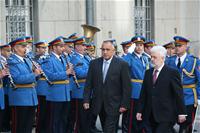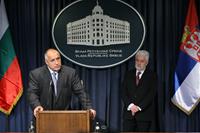Serbian investments for the Belene nuclear power plant
Dessislava Dimitrova, April 28, 2010
 The schedule of the Bulgarian prime minister these days is very much like the one in George Clooney's character in the movie Up in the Air, where he is flying from a city to city in the US to fire people and his life loses sense when his company decides to cut spending and makes him do his work via the Internet. From Varna to Syria and then back to Sofia, then Belgrade. But before that there was a stop over in Santiago Bernabeu in Madrid for the game of the favourite team Real. The scale is not only in the distances but also in the intentions.
The schedule of the Bulgarian prime minister these days is very much like the one in George Clooney's character in the movie Up in the Air, where he is flying from a city to city in the US to fire people and his life loses sense when his company decides to cut spending and makes him do his work via the Internet. From Varna to Syria and then back to Sofia, then Belgrade. But before that there was a stop over in Santiago Bernabeu in Madrid for the game of the favourite team Real. The scale is not only in the distances but also in the intentions.
One such intention is enhancing stability in the region: "It is known that my position and the position of my party is that the Balkans can start looking like Europe only when we unite, when Serbia and Croatia join the EU. Only then the Balkans can turn into a centre of prosperity and stability and not of wars and conflicts", the premier said during his visit in the Serbian capital, quoted by the Serbian TV B92.
And, according to the Kosturitsa's movies, the unification of the Balkans should start with the simple things, so it is most important people to be able to travel from one country to the other. According to the agreement between the two premiers - Boyko Borissov and Mirko Tsvetkovich, the highway between Sofia and the Serbian town of Nish will be ready by 2012.
A small detail is that the Serbian government has already negotiated funding from the World bank by 2012 for the construction of the most difficult part of the highway, as Mr Borissov noted. While the project for the Bulgarian segment of the road (60 km long) will be ready by the end of the year and our country is yet to ask for 350 mn euro funding from the European funds. Either way, all of us that have traveled this route hope all these good ideas to come true and, instead of broken roads to drive on highways like those that connect Nish with Belgrade and Zagreb, for example.
Behind the lines a good news for Russia comes up: Bulgaria and Serbia had agreed that South Stream was a project of strategic importance for both countries. As the position of Bulgaria has not been clear so far, now we can say that Bulgaria will continue its participation in the project without reconsidering it as were the initial statements of the government.
Another news from Borissov's visit in Serbia is that Belgrade is considering  whether and how to join the project for the construction of a second nuclear power plant in Bulgaria - Belene. The Vecernje Novosti newspaper quoted prime minister Tsvetkovich saying that "Serbia's participation in Belene, even a symbolic one, would mean that this is a joint project between the two countries". In fact, the reason could be that in Serbia there is a moratorium on the construction of nuclear plants, as B92 noted.
whether and how to join the project for the construction of a second nuclear power plant in Bulgaria - Belene. The Vecernje Novosti newspaper quoted prime minister Tsvetkovich saying that "Serbia's participation in Belene, even a symbolic one, would mean that this is a joint project between the two countries". In fact, the reason could be that in Serbia there is a moratorium on the construction of nuclear plants, as B92 noted.
Another piece of the jigsaw-puzzle is also the fact that all important energy projects in Serbia are officially Russian since Gazprom bought the oil refinery Naftna Industrija Srbije, and the local gas company Srbijagas and Gazprom established a joint company for the construction of the Serbian segment of South Stream and another one that will manage the gas depository Banatski dvor in Serbia.
And as mentioned before - the gas that has to start flowing in the pipeline Dupnitsa-Nish (also discussed by the premiers of Serbia and Bulgaria), will again be Russian and diversification will again be slightly different in meaning. It is also interesting to understand how Serbian intentions incorporate in Bulgarian declarations for finding European funding for Belene.
And all this in the day of the 24th anniversary of the Chernobyl incident.